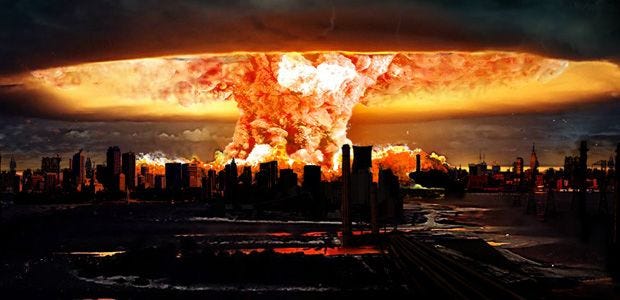The Paper Tiger and the Patient Dragon: How China Outmaneuvered the American Deep State
Lawlessness of the deep state may now resort to nuclear brinkmanship to cling to power.
By Karim Bettache
The United States presents itself as a shining city on the hill, a beacon of democracy and freedom. But beneath the illusion of American exceptionalism lies a dark reality of imperial overreach and lawless domination. For over seven decades, an unelected network of power has pulled the strings of American policy, pursuing global hegemony while subverting democracy at home.
Aaron Good, a historian of U.S. empire and the author of the book American Exception, calls this network the "deep state" - an entrenched "security state" that intervenes in politics when needed to achieve its goals. Good traces the origins of the deep state to World War II, when Wall Street bankers and the corporate elite plotted to make the U.S. the global hegemon of capitalism. The Central Intelligence Agency was created as Wall Street's "secret police" to do the dirty work of defending this empire.
Since then, the deep state has acted with impunity, orchestrating coups, assassinations and election meddling across the globe. All in the name of "national security" and the "free world." The lawlessness and secrecy required for this has undermined democracy in the U.S. itself. Good points to the JFK assassination as a prime example of deep state intervention to veto the will of the American people.
The toll of this unaccountable empire has been immense - millions dead in wars for corporate profit, entire regions shredded by chaos and conflict. Yet the elite behind it all have prospered immensely, enriching themselves while hiding the ugly reality behind a facade of American exceptionalism.
Now, Good argues, the empire is finally crumbling. Faced with a multipolar world and the rise of China, U.S. power is waning. But the deep state still poses a grave threat, pushing nuclear brinkmanship and conjuring new crises to maintain control. The only hope, Good says, lies in a political transformation that forces the empire to reverse course - before it takes the rest of humanity down with it in a final spasm of dominance.
China's patient strategy has been key to undermining U.S. hegemony. Good notes that when China joined the global capitalist economy in the 1980s and 1990s, U.S. elites thought this would corrupt and democratize China, making it subordinate to U.S. interests. But the Chinese studied their history and played a long game, acquiring economic and technological might while remaining committed to a multipolar world order.
The U.S. system, Good argues, has demanded that all other countries submit to its dictates or face consequences. But now that China offers an alternative, countries are taking it - and U.S. dominance is crumbling. The illusion of American exceptionalism blinds U.S. leaders to this reality and the historical laws that inevitably bring down empires. Good warns that the Pentagon's "muscle-bound" military - unable to use nuclear weapons or field troops at China's level - is now a "paper tiger."
The only rational choice for the U.S., Good says, is to reverse course, accept a multipolar world and share technology to create global prosperity. Something unprecedented may be needed in the 2024 election to change the imperial consensus. But without fundamental reform, Good fears the deep state may resort to nuclear brinkmanship, false flag crises or some catastrophic "deep event" to cling to power - threatening the very future of humanity.




